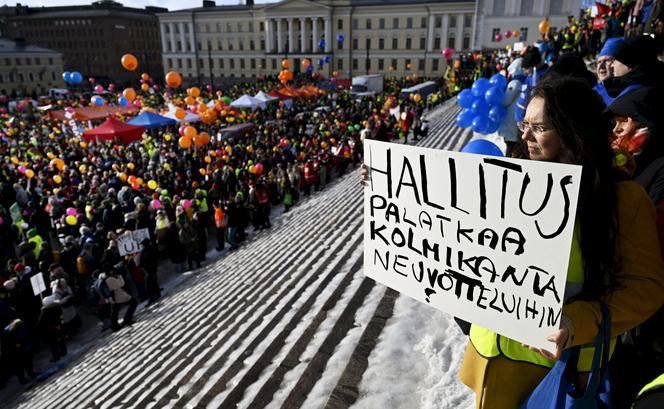


Since Wednesday, January 31, whole sectors of the Finnish economy have been on hold, after the two trade union confederations, SAK and STTK, called for a strike against the labor market and welfare reforms announced by the right-wing and far-right government coalition, led by the conservative Petteri Orpo. More than 500 flights were canceled, buses were at a standstill, schools and factories were closed and mail was blocked.
On February 1, at least 300,000 Finns went on strike. In Helsinki, thousands of demonstrators converged on Senate Square, in front of the cathedral. They booed Employment Minister Arto Satonen (National Coalition Party), who had come to defend his government's policy: "For 10 years, Finland has had no growth and has created no jobs. The number of businesses is falling and companies are going bankrupt. Doing nothing is not an option," he insisted.
The Finns are protesting against a series of measures that they believe will restrict their rights and worsen their working conditions. In particular, the government plans to limit the right to strike, with a law on "industrial peace" that aims to limit work stoppages to 24 hours, increase fines for industrial action deemed illegal and minimize the room for maneuver by the National Conciliator's Office during labor disputes.
The coalition government, which has been in power since June 2023, also wants to give companies more leeway when it comes to hiring and firing. Companies with fewer than 50 employees will no longer be obliged to rehire an employee laid off less than four months ago in order to fill their position. One-year employment contracts will be authorized, and companies will be able to negotiate local agreements without involving the unions.
Moreover, in the event of sick leave, the first day will no longer be paid. Most social benefits will be cut, such as unemployment, housing and parental leave. Support for adult training will be abolished. According to union calculations, single parents could lose up to €500 a month.
Finally, the government wants to align wage increases for each sector, regularly negotiated by management and labor, with those of export industries, which will set a ceiling. For the unions, this is a clear challenge to the model of social dialogue on which the Finnish labor market is based.
From Brussels, where he was attending the European summit on Thursday, Prime Minister Orpo was adamant: "Strikes of this magnitude, that will cause great losses to the Finnish economy in a difficult economic situation, are excessive and disproportionate," he said, adding that the reforms were "necessary" for Finland and "should have been carried out a long time ago."
You have 35% of this article left to read. The rest is for subscribers only.
